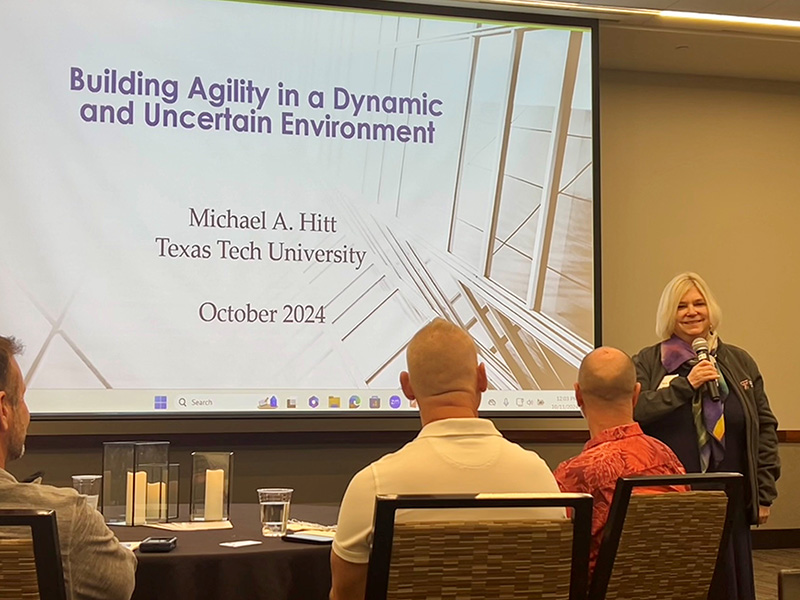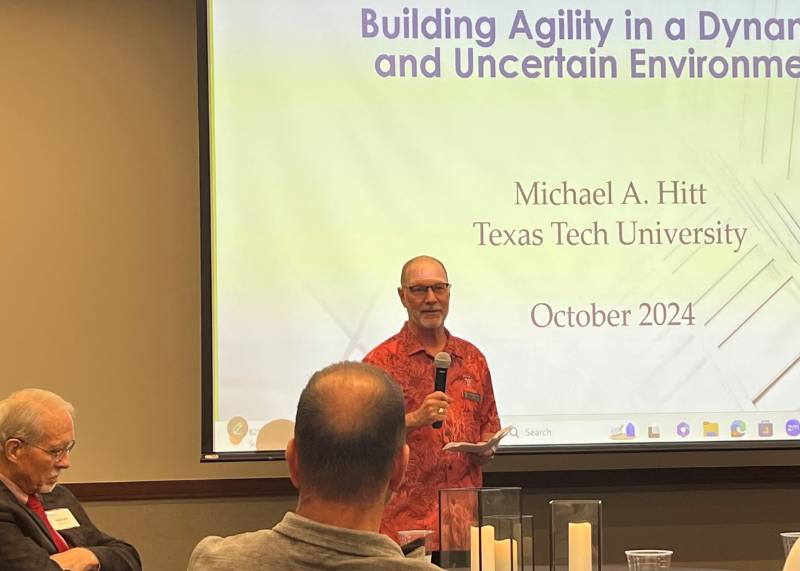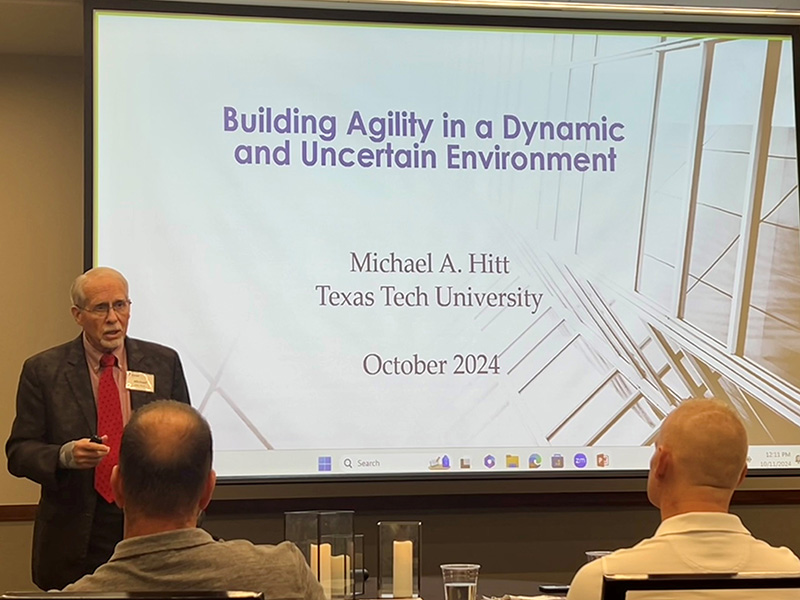From shaping changing environments to become leaders in new opportunities, to the two qualities most effective leaders don’t have, the speakers shared management strategies and acknowledged the lasting impact Whitehead’s teachings had on their careers.
It’s not every day you get to hear from nationally renowned, distinguished research scholars who are listed as the third highest ranked business and management scientist in the world and in the top two percent of highly cited researchers. Unless, of course, you were at the Rawls College of Business for the Carlton J. Whitehead Distinguished Speaker Series Oct. 11, 2024.
Mary Frances Weatherly, faculty director for the Rawls College Online BBA program and associate professor of practice for marketing and supply chain management, said she read the speakers’ strategic management books during her capstone course at Rawls and is also a former student of Whitehead’s.
“Knowing Hitt and Ireland were also students of Whitehead,” she said, “it was surreal to not only be hearing from the authors’ I studied, but to also know the scholarly feats they’ve accomplished and that they both learned under Whitehead, too, is amazing.”
Weatherly took Whitehead’s disruptive innovation class during her master’s degree program at Rawls College and later did an individual study with him on the same topic.
“His class was one of my favorites,” she added. “I really enjoyed listening to him – he was one of those professors you knew you were fortunate to be sitting in his class.”

Tara Whitehead Stotland, daughter of Carlton Whitehead, shared a story about a time when one of her friends called her asking for help. Evidently, he’d registered for her dad’s class and found out after the fact that Whitehead was known for being one of the hardest professors. Being her friend, he thought she could put in a good word for him.
“What I told him was that if my dad found out he was my friend, he’d hold him to even higher expectations...and that wouldn’t turn out well for him,” Stotland mused. “To this day, he says he couldn’t be prouder of the C he got in dad’s class.”
Gardner’s Nod to Whitehead and Hitt’s Presentation on Building Agility
William Gardner, Paul Whitfield Horn professor, Jerry S. Rawls chair in leadership, and director for the Institute for Leadership Research at Rawls College, began the event with his own nod to Whitehead.

“Carlton Whitehead was a triple threat – excelling in teaching, research, and service,” he said. “This speaker series is in honor of his 47 years of teaching at Texas Tech and to the policies, procedures, and culture he developed that are still felt at the college today.”
Before beginning his presentation, Michael Hitt, Ph.D., acknowledged Whitehead’s influence on his own career.
“Carlton was both a role model and mentor to me,” he said. “He was the inspiration for me to attain my MBA and he was the one reason why I got a Ph.D.”
Beginning his presentation on Building Agility in a Dynamic and Uncertain Environment, Hitt asked the audience where their life was in 2014. Aside from the continuous technology changes that happened over the past 10 years – using the examples of only 58 percent of people having cell phones then compared to today’s 94 percent, the launch of social media and its growth, and the addition of AI – he pointed out that like humans, businesses also have to adapt and change. To sell their products, businesses must adapt to technological changes, socio-political and policy changes, and geo-political changes that affect their prices and supply chain.

Hitt explained that for businesses to build agility in a dynamic environment, they must develop a strong research portfolio, build human capital through training and development while holding on to valuable knowledge, and build and maintain social capital (i.e., suppliers and customers). He said strategies to do this include being entrepreneurial, having a flexible mindset and being open to change, being alert and not waiting to act, and identifying new opportunities and shaping the environment to be a leader in those opportunities.
In Whitehead’s system theory class 55 years ago, Hitt added as a final remark, he learned that all systems tend toward disintegration or death, called entropy. The goal, he said, is to achieve negative entropy – think of it like everyday things we do to extend the life of something, for example, changing the oil in a vehicle to prolong its running, rotating tires to reduce tread wear, and eating a healthy diet to live longer lives. For businesses to achieve this, he closed, they must continuously learn and exercise effective leadership.
From Building Agility to Ireland’s Presentation on Continuous Learning
Beginning his presentation on Continuous Learning as a Path to Leadership Success, Duane Ireland, Ph.D., credited Whitehead for literally changing his life 55 years ago when Ireland took his organizational theory class.

Ireland explained leadership as helping others through a self-guided discovery and said the foundation of effective leadership is based on three things: continuous learning through frequent mentorship, soliciting and listening to feedback, and anticipating future states or what’s coming. He listed several qualities of effective leaders and said while most of the qualities can easily be seen in good leaders, the two that most leaders don’t have are humility and nobility.
In closing, Ireland said there are always two outcomes in doing things – the win and the learning opportunities. To benefit from these outcomes, he charged the audience to always ask two questions – why something didn’t work, with a focus on the outcomes for understanding, not criticizing, and why the organization succeeded.
At the end, Sebastian Gomez, a current management student, asked Ireland if he thought toxic leadership was effective pointing out that CEOs who use this style of leadership seem to get the best outcomes from their teams but questioned the ethicality. Ireland answered emphatically no, explaining that toxic leadership is not an effective long-term leadership strategy because it’s exhausting – both for the leader and for the team.



